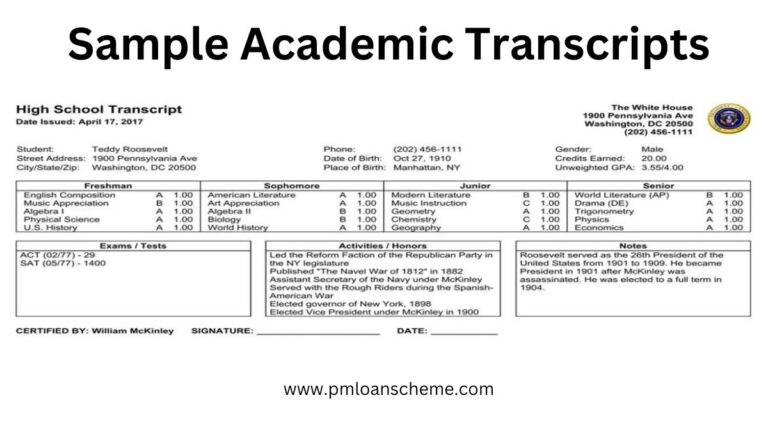How to Convert CGPA into Marks? CGPA to Marks: Converting CGPA (Cumulative Grade Point Average) to percentage marks is an essential process for students, especially when applying for further studies or job opportunities where percentage marks are a standard requirement. This comprehensive guide will delve into the methods of calculating CGPA into percentage marks, provide relevant formulas, include examples, and discuss the significance of understanding this conversion.
How to Convert CGPA into Marks
Before we delve into the conversion process, it’s crucial to understand what CGPA represents. CGPA is an academic grading system used in various educational institutions worldwide. It is a measure of a student’s academic performance, calculated based on the grades received in all subjects over a certain period, typically an academic year.
CGPA is calculated on a scale, usually from 0 to 10 or 0 to 4, depending on the institution. Each grade a student receives is assigned a specific grade point, and the CGPA is the average of these grade points.
CGPA into Marks Conversion Process
Have you ever wondered how to convert CGPA into marks? The Cumulative Grade Point Average (CGPA) is a term you might have encountered when your Class 10 board results were announced. It is represented by a value ranging from 4 to 10, rather than a percentage. Many students find it challenging to interpret their CGPA and are curious about the process of converting it into total marks.

After the board examinations, some universities request the “full marks” from students as part of their admission requirements. This means students need to convert their CGPA scores into marks. In this guide, we will show you how to make this conversion, a skill that will be useful throughout your academic journey, whether you plan to study in India or abroad.
For Example: To convert a CGPA of 7 into marks when the total marks are 600.
Education Loan for Abroad Studies
CGPA to Marks Conversion
The conversion factor for CGPA to marks can differ from one university to another, even within the same country. This variation arises because each institution may employ its own grading system and evaluation standards. Therefore, it is recommended to consult your university for specific conversion factors or formulas they use.
To convert CGPA into marks, you can use the following formula:
Formula to convert CGPA into Marks: CGPA*9.5*Full Marks/100
Importance of CGPA
- Uniform Assessment: CGPA provides a standardized method for assessing students’ performance across various subjects.
- Comparative Analysis: It allows for the comparison of academic performance between students in the same or different programs.
- Simplified Calculations: Students and educational institutions find CGPA easier to manage than percentages, as it simplifies grade tracking and reporting.
How is CGPA Calculated?
CGPA is calculated using the following formula:
Where:
- Credit Points are the credits assigned to a particular subject.
- Grade Points are the points assigned to the grades earned.
Example of CGPA Calculation
Let’s say a student has taken four subjects with the following details:
| Subject | Credits | Grade | Grade Points |
|---|---|---|---|
| Math | 3 | A | 9 |
| Science | 4 | B | 8 |
| History | 3 | A | 9 |
| English | 2 | C | 7 |
Step 1: Calculate Credit Points for each subject:
- Math: (3 * 9 = 27)
- Science: (4 * 8 = 32)
- History: (3 * 9 = 27)
- English: (2 * 7 = 14)
Step 2: Sum of Credit Points:
Step 3: Sum of Total Credits:
Step 4: Calculate CGPA:
Converting CGPA to Percentage
Converting CGPA to percentage marks is essential for various academic and professional pursuits. The conversion formula can vary slightly between different institutions, but a widely accepted formula is:
This formula is based on the assumption that the maximum CGPA is 10. Hence, multiplying CGPA by 9.5 provides an approximate percentage. However, some institutions might use a different multiplier based on their specific grading systems.
CGPA to Marks Calculator
Using the previous example where the CGPA is 8.33:
This means that a CGPA of 8.33 corresponds to approximately 79.16%.
Different CGPA Conversion Scales
While the 9.5 multiplier is commonly used, some educational institutions may adopt different multipliers. Here’s a quick comparison of CGPA conversion formulas used by various universities:
| Institution | CGPA Scale | Conversion Formula |
|---|---|---|
| University A | 10 | Percentage = CGPA × 9.5 |
| University B | 4 | Percentage = CGPA × 25 |
| University C | 10 | Percentage = CGPA × 10 |
Always check with your specific institution to confirm the appropriate conversion method.
Converting CGPA to Marks for Studying Abroad
If you’re considering studying abroad, it’s essential to understand how to convert CGPA into marks. Different countries employ varying grading systems, and some institutions may request either CGPA or marks as part of their admission process. Therefore, it’s important to report your scores according to the specific grading scale used by the university.
Keep in mind that conversion methods can differ across countries and universities. Some may follow a 4.0 scale, while others use a 10.0 scale. Consequently, knowing how to convert a 10-point CGPA to a 4-point GPA can be beneficial.
How to Calculate CGPA for Studying Abroad
Converting CGPA to Marks for CBSE
The Central Board of Secondary Education (CBSE) provides a straightforward formula for converting CGPA to percentage marks:
The formula for converting CGPA to Marks for CBSE percentage = 9.5 * CGPA
This formula is applicable when the total marks are 500. The following table gives you a quick overview of CGPA conversions:
| CGPA | Percentage | Marks |
|---|---|---|
| 10 | 95 | 475 |
| 9.5 | 90.25 | 451.25 |
| 9 | 85.5 | 427.5 |
| 8.5 | 80.75 | 403.75 |
| 8 | 76 | 380 |
| 7.5 | 71.25 | 356.25 |
| 7 | 66.5 | 332.5 |
| 6.5 | 61.75 | 308.75 |
Why Convert CGPA to Marks?
Students can easily find their CGPA on their scorecards, but many struggle with understanding how that translates to total marks. This conversion is crucial when applying for higher education, as well as for job applications where candidates may be evaluated based on their scores. Universities often require applicants to fill in their percentage of total marks on their application forms. Students can utilize the CBSE CGPA calculator available online or apply the aforementioned formula to convert their CGPA into marks. The table above can help clarify this process.
Understanding the Grading Scale
Here’s a breakdown of the grading system based on marks:
| Marks Range | Grade Score | CGPA |
|---|---|---|
| 91-100 | A1 | 10 |
| 81-90 | A2 | 9 |
| 71-80 | B1 | 8 |
| 61-70 | B2 | 7 |
| 51-60 | C1 | 6 |
| 41-50 | C2 | 5 |
| 31-40 | D1 | 4 |
How to Calculate CGPA from Marks in CBSE
The CBSE conducts board examinations for classes 10 and 12. Students in CBSE-affiliated schools need to sit for these annual exams, and the Central Board of Secondary Education employs a CGPA system for grading. Here’s how to convert your CGPA into marks using a sample calculation.
Subject Grades:
| Subject | Grade |
|---|---|
| English | 7 |
| Hindi | 8 |
| Math | 9 |
| Science | 8 |
| Social Science | 9 |
Total CGPA Calculation:
Convert CGPA to Marks:
How to Calculate CGPA from Marks
To derive CGPA from total marks, first determine whether your university uses a specific grading scale. If not, you can follow these general steps to calculate your CGPA from marks:
Step 1: Convert your total marks into a percentage.
Step 2: Divide the percentage by 9.5 to find your CGPA.
Example: Convert 390 marks into CGPA (Total Marks = 500)
- Percentage Calculation:
- CGPA Calculation:
Factors Beyond CGPA for Studying Abroad
While CGPA is an important aspect of your academic profile, foreign universities often consider other factors during the admission process. In addition to your academic performance, elements such as standardized test scores, statements of purpose (SOPs), letters of recommendation (LORs), and extracurricular activities also play a significant role.
Factors Affecting CGPA to Percentage Conversion
- Credit Distribution: The number of credits assigned to each subject can influence the CGPA calculation.
- Grade Point System: Different institutions may have varying grade point systems, leading to differences in CGPA.
- Maximum CGPA: The maximum CGPA scale (e.g., 10, 4) plays a crucial role in determining the conversion factor.
Importance of CGPA to Percentage Conversion
- Admission Requirements: Many universities and colleges require percentage marks for admission into higher studies. Understanding CGPA to percentage conversion helps students meet these requirements.
- Job Applications: Employers often look for percentage marks in resumes. Being able to convert CGPA to percentage can enhance job prospects.
- Academic Performance Evaluation: Understanding how CGPA translates to percentage allows students to better assess their academic performance over time.
Additional Tips for Students
- Keep Track of Your Grades: Regularly monitor your grades to understand how they affect your CGPA.
- Plan Your Subjects Wisely: Choose subjects wisely based on your strengths to maintain a good CGPA.
- Consult Faculty: If you’re uncertain about the grading system, consult with faculty members for guidance.
Example Tables for CGPA Calculation
| Subject | Credits | Grade | Grade Points | Credit Points |
|---|---|---|---|---|
| Math | 3 | A | 9 | 27 |
| Science | 4 | B | 8 | 32 |
| History | 3 | A | 9 | 27 |
| English | 2 | C | 7 | 14 |
| Total | 12 | 100 |
Example Table for CGPA Conversion
| CGPA | Percentage |
|---|---|
| 4.0 | 40% |
| 6.0 | 60% |
| 7.5 | 71.25% |
| 8.0 | 76% |
| 9.0 | 85.5% |
Summary of Key Points
- CGPA is a comprehensive way to assess academic performance.
- Understanding the conversion to percentage marks is crucial for academic and professional pursuits.
- Utilize provided formulas and examples to make your calculations accurate and straightforward.
This guide should provide you with a solid foundation in understanding CGPA, its calculations, and how to convert it into percentage marks. Understanding these concepts will empower you as you navigate your educational journey.
Conclusion
In conclusion, understanding how to convert CGPA into percentage marks is crucial for students navigating their academic journeys. With the provided formulas and examples, students can easily calculate their CGPA and convert it into percentage marks as needed.
Frequently Asked Questions (FAQs)
What is the difference between CGPA and GPA?
GPA (Grade Point Average) refers to the average of grade points earned in a single term or semester, while CGPA (Cumulative Grade Point Average) is the average of grade points earned across multiple terms or semesters.
Can CGPA be less than 0?
No, CGPA is calculated on a defined scale (usually starting from 0). A CGPA below this scale indicates a failing performance.
How often is CGPA calculated?
CGPA is typically calculated at the end of each semester or academic year, depending on the institution’s grading policy.
Is the CGPA system used worldwide?
While many institutions use the CGPA system, the specific scale and grading methods can vary significantly across different countries and educational systems.
What should I do if my institution does not provide a clear conversion formula?
Always refer to your institution’s academic handbook or consult with academic advisors to clarify any uncertainties regarding CGPA and percentage conversions.
Conclusion
Understanding how to convert CGPA into marks is essential for Indian students looking to study either domestically or abroad. This guide provides you with the necessary tools to convert your CGPA to marks and to comprehend the conversion factors used by various universities. This knowledge can significantly impact your academic journey, helping you present your performance effectively and enhancing your chances of securing admission or landing your dream job.


